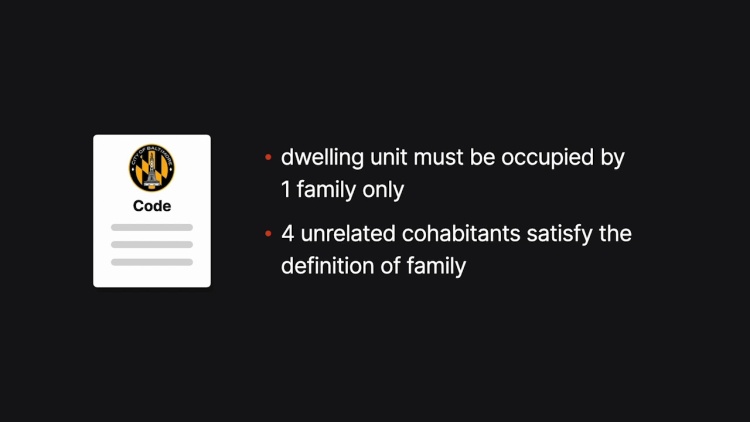Armstrong v. Mayor
Maryland Supreme Court
979 A.2d 98 (2009)

- Written by Sean Carroll, JD
Facts
Cresmont Properties Ltd. received construction and occupancy permits for a parcel of land in Baltimore City. Cresmont sought to build a residential complex with 26 four-bedroom suites, and the permits were for 26 dwelling units. The Baltimore City Zoning Code defined “dwelling unit” as a building occupied by a family. The code defined “family,” among other things, as “a group of not more than four people, who need not be related by blood, marriage, or adoption, living together as a single housekeeping unit in a dwelling unit.” The code does not define “single housekeeping unit.” Cresmont planned to lease each bedroom in each suite separately, under one-year lease terms. Under the leases, the tenants would share the common areas in the suites. The Baltimore City Department of Housing and Community Development (defendant) granted Cresmont’s permits. A group of neighborhood residents opposed to Cresmont’s development of the property (plaintiffs) appealed the issuance of the permits, arguing that the complex constituted 104 individual “rooming units,” not 26 dwelling units. The board affirmed the issuance of the permits, finding that the four tenants in each suite together constituted a single housekeeping unit, and thus, under the code, a family. The circuit court and the court of special appeals affirmed. The Maryland Supreme Court granted the plaintiffs’ petition for certiorari.
Rule of Law
Issue
Holding and Reasoning (Harrell, J.)
What to do next…
Here's why 907,000 law students have relied on our case briefs:
- Written by law professors and practitioners, not other law students. 47,100 briefs, keyed to 996 casebooks. Top-notch customer support.
- The right amount of information, includes the facts, issues, rule of law, holding and reasoning, and any concurrences and dissents.
- Access in your classes, works on your mobile and tablet. Massive library of related video lessons and high quality multiple-choice questions.
- Easy to use, uniform format for every case brief. Written in plain English, not in legalese. Our briefs summarize and simplify; they don’t just repeat the court’s language.





